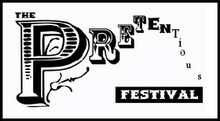
Jason Zinoman is a man of discerning taste and wide-ranging intellect. His critical opinion was honed to an incisive cusp when he came to see the premiere of Every Play Ever Written, as presented by The Brick's Robert Honeywell on Friday last. The New York Times review can be read HERE, and you should wear sunglasses because it is glaringly positive.
Meanwhile, Mr. Honeywell took time off from circumnavigating his private island via unicorn-powered jet-ski to answer our questionnaire.
What exactly makes your show so damn pretentious anyway?
Our show is not pretentious. Our show is an example of the hard work of theatrical exploration in action. Great things come to those who run hard and long for them.
Name some obscure influences on your work – extra points for unpronounceability.
Professor John E. Hankins at the University of Maine stunned me with his trenchant observations in the Pelican Shakespeare on the meaning of young love in Romeo & Juliet. As did Professor G. L. Anderson on his extraordinary analysis of the erotic rasa in Abhijñana-Sakuntalam, composed by the amazing Classical Indian playwright Kalidasa between the first century B.C. and the fourth century A.D. But where would my understanding of theatre be without Professor C.A. Robinson, Jr’s moving description of the skene and all that emerged from behind its protective walls. This one’s for you, C.A.
The late Roland Barthes once wrote "For the theatre one needs long arms; it is better to have them too long than too short. An artiste with short arms can never, never make a fine gesture." Explicate.
I disagree with Mr. Barthes. My arms are relatively short and I act beautifully.
In what ways do you plan on alienating your audience? Cite an intentionally opaque or confusing moment within your production.
We do not seek to confuse or opaque anyone in the audience. The audience is our friend, our co-traveler, our bunkmate, on this our journey through the ocean of theatre.
Which other Pretentious Festival show will you declare as your sworn ideological enemy, and why?
Michael Gardner’s Nothing. Please see our show to understand why. The divisions between us are now so deep as to be irreparable. I still don’t see how he could do this to me.
Please give us the gist of the acceptance speech you would use were you to win one of our Pretentious Awards.
I would thank you, the Audience, and my extraordinary cast of Actors (Audrey, Lynn & Moira) and my extraordinary stage manager and board op (Rasha), for using their love and support, their skill and dedication and unwavering teamwork, to take me deeper and yet me more deeply into the deep, dark, soothing essence of Theatre. I would not thank Michael Gardner or his show Nothing.










